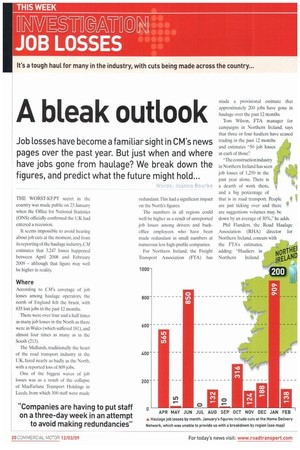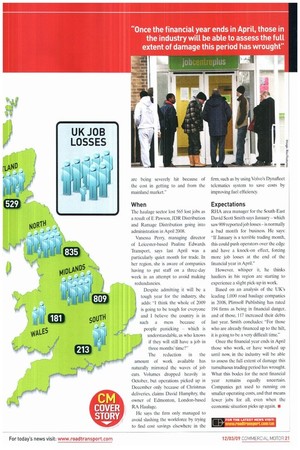A bleak outlook
Page 20

Page 21

If you've noticed an error in this article please click here to report it so we can fix it.
Job losses have become a familiar sight in CM's news pages over the past year. But just when and where have jobs gone from haulage? We break down the figures, and predict what the future might hold...
Joanna Bourke
THE WORST-KEPT secret in the country was made public on 23 January when the Office for National Statistics (ONS) officially confirmed the UK had entered a recession.
It seems impossible to avoid hearing about job cuts at the moment, and from its reporting of the haulage industry. CM estimates that 3,247 losses happened between April 2008 and February 2009 — although that figure may well be higher in reality.
Where
According to CM's coverage of job losses among haulage operators, the north of England felt the brunt, with 835 lost jobs in the past 12 months.
There were over four and a half times as many job losses in the North as there were in Wales (which suffered 181), and almost four times as many as in the South (213).
The Midlands, traditionally the heart of the road transport industry in the UK, fared nearly as badly as the North, with a reported loss of 809 jobs.
One of the biggest waves of job losses was as a result of the collapse of MacFarlane Transport Holdings in Leeds, from which 300 staff were made redundant.This had a significant impact on the North's figures.
The numbers in all regions could well be higher as a result of unreported job losses among drivers and backoffice employees who have been made redundant in small numbers at numerous less high-profile companies.
For Northern Ireland, the Freight Transport Association (ETA) has made a provisional estimate that approximately 200 jobs have gone in haulage over the past 12 months.
Tom Wilson, PTA manager for campaigns in Northern Ireland, says that three or four hauliers have ceased trading in the past 12 months and estimates "50 job losses at each of those': "The construction industry in Northern Ireland has seen job losses of 1,250 in the past year alone. There is a dearth of work there, and a big percentage of that is in road transport. People are just ticking over and there are suggestions volumes may be down by an average of 30%," he adds. are being severely hit because of the cost in getting to and from the mainland market."
When
The haulage sector lost 565 lost jobs as a result of E Pawson, JDR Distribution and Ramage Distribution going into administration in April 2008.
Vanessa Perry, managing director of Leicester-based Pauline Edwards Transport, says last April was a particularly quiet month for trade. In her region, she is aware of companies having to put staff on a three-day week in an attempt to avoid making redundancies.
Despite admitting it will be a tough year for the industry, she adds: "I think the whole of 2009 is going to be tough for everyone and 1 believe the country is in such a mess because of people panicking which is understandable, as who knows if they will still have a job in three months' time?"
The reduction in the amount of work available has naturally mirrored the waves of job cuts. Volumes dropped heavily in October, but operations picked up in December only because of Christmas deliveries, claims David Humphry, the owner of Edmonton, London-based RA Haulage.
He says the firm only managed to avoid slashing the workforce by trying to find cost savings elsewhere in the firm, such as by using Volvo's Dy-nafleet telematies system to save costs by improving fuel efficiency.
Expectations
RHA area manager for the South-East David Scott Smith says January which saw 909 reported job lossesis normally a bad month for business. He says: If January is a terrible trading month, this could push operators over the edge and have a knock-on effect, forcing more job losses at the end of the financial year in April."
However, whisper it, he thinks hauliers in his region are starting to experience a slight pick-up in work.
Based on an analysis of the UK's leading 1,000 road haulage companies in 2008, Plimsoll Publishing has rated 194 firms as being in financial danger, and of those, 117 increased their debts last year. Smith concludes: "For those who are already financed up to the hilt, it is going to be a very difficult time."
Once the financial year ends in April those who work, or have worked up until now, in the industry will be able to assess the full extent of damage this tumultuous trading period has wrought. What this bodes for the next financial year remains equally uncertain. Companies get used to running on smaller operating costs, and that means fewer jobs for all, even when the economic situation picks up again. •
FOR THE LATEST HEWS VISIT:
rtv www.roadtransponcancm




















































































































































